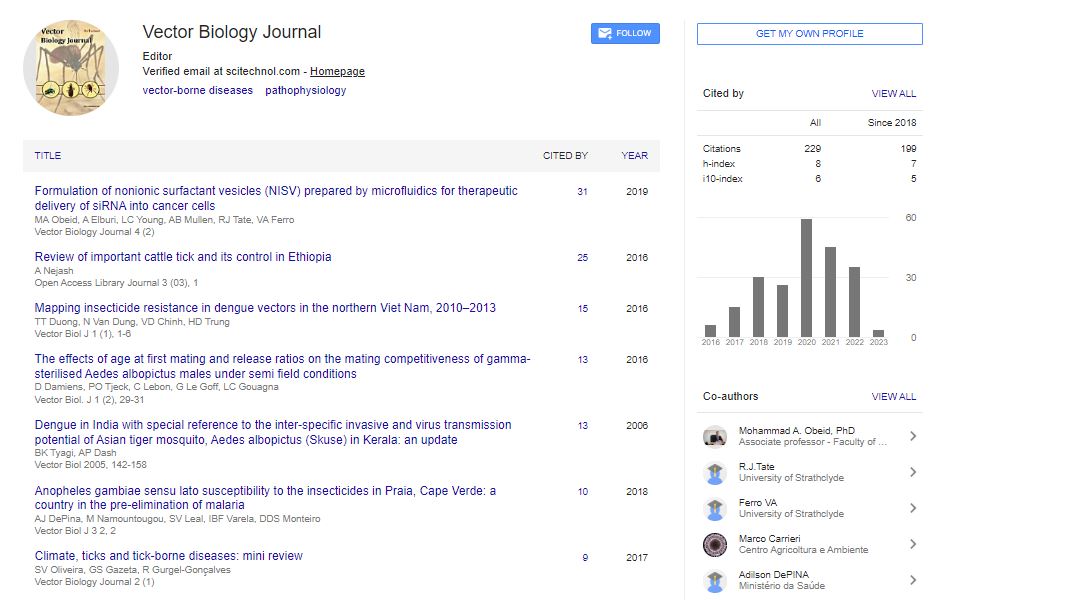Opinion Article, Vector Biol Vol: 8 Issue: 2
An Overview on Vector Ecology and its Control Strategies
Dantas Torres*
1Department of Veterinary Medicine, University of Bari Aldo Moro, Bari, Italy
*Corresponding Author: Dantas Torres,
Department of Veterinary Medicine,
University of Bari Aldo Moro, Bari, Italy
E-mail: torres.dantas@uniba.it
Received date: 30 May, 2023, Manuscript No. VBJ-23-107341;
Editor assigned date: 02 June, 2023, PreQC No. VBJ-23-107341 (PQ);
Reviewed date: 16 June, 2023, QC No. VBJ-23-107341;
Revised date: 23 June, 2023, Manuscript No. VBJ-23-107341 (R);
Published date: 30 June, 2023 DOI: 10.4172/2473-4810.1000267.
Citation: Torres D (2023) An Overview on Vector Ecology and its Control Strategies. Vector Biol 8:2.
Description
Vector ecology is a branch of science that focuses on understanding the ecological dynamics between vectors, humans, and the environment. Vectors are organisms, usually arthropods like mosquitoes, ticks, and fleas that transmit diseases from one host to another. Vector-borne diseases pose a significant global health threat and can have a profound impact on human populations, particularly in regions where vectors are abundant. To effectively control and prevent vector-borne diseases, it is crucial to comprehend the intricate relationship between vectors, their habitat, and human behavior.
Vector biology encompasses the study of the life cycles, feeding habits, and reproduction patterns of vectors. Understanding these aspects is essential in developing effective control strategies. For instance, mosquitoes, the primary vectors of diseases such as malaria, dengue fever, and Zika virus, have complex life cycles that involve both aquatic and terrestrial stages. Female mosquitoes require blood meals to obtain the necessary nutrients for egg development, while males feed exclusively on plant nectar. Knowledge of the specific ecological requirements and behavior patterns of vector species aids in targeting control measures more precisely.
Vectors exhibit preferences for specific habitats that provide suitable conditions for their survival and reproduction. These preferences are influenced by various environmental factors, including temperature, humidity, vegetation cover, and availability of breeding sites. For example, Aedes mosquitoes, responsible for transmitting dengue fever and other arboviruses, thrive in urban environments with stagnant water sources like discarded containers and blocked drains. Understanding the ecological niche of vectors and their preferred habitats can help identify high-risk areas for disease transmission and implement targeted interventions, such as larval source reduction or insecticide application.
Environmental factors play a critical role in shaping vector populations and their capacity to transmit diseases. Climate variables, such as temperature and rainfall patterns, directly affect vector abundance, distribution, and behavior. Changes in climate can lead to shifts in vector ranges, altering disease transmission patterns and introducing new risks to previously unaffected areas. For instance, rising temperatures may expand the geographical range of mosquitoes, exposing populations to diseases like malaria and dengue in regions where they were previously absent.
Additionally, habitat modification and urbanization can influence vector populations. Deforestation, urban expansion, and the construction of water reservoirs can create new breeding sites and alter vector abundance. Increased human movement and international travel also contribute to the spread of vectors and the diseases they carry. Understanding the relationship between environmental factors and vector populations is crucial for predicting disease outbreaks, designing targeted surveillance systems, and implementing effective control strategies.
Vector control strategies
Vector control strategies aim to minimize vector populations and reduce the risk of disease transmission. Integrated Vector Management (IVM) is a comprehensive approach that combines multiple strategies tailored to the specific ecological context. These strategies include:
Environmental management: Modifying the environment to reduce vector breeding sites, such as eliminating standing water or improving drainage systems.
Insecticide application: The targeted use of insecticides to kill adult vectors or disrupt their life cycle stages.
Biological control: The introduction of natural predators, such as fish or bacteria, to reduce vector populations.
Personal protection measures: Encouraging the use of insect repellents, bed nets, and protective clothing to minimize human-vector contact.
Health education and community engagement: Raising awareness about vector-borne diseases, their prevention, and encouraging community participation in control efforts.
Vector ecology provides valuable insights into the complex interplay between vectors, humans, and the environment. By understanding vector biology, behavior, and habitat preferences, as well as the impact of environmental factors on vector populations, we can develop effective strategies to control and prevent vector-borne diseases. Ongoing research and surveillance are crucial to stay ahead of emerging vector-borne threats and adapt control measures accordingly. A multidisciplinary approach, involving ecologists, entomologists, public health experts, and policymakers, is essential to tackle the challenges posed by vector-borne diseases and protect human populations worldwide.
 Spanish
Spanish  Chinese
Chinese  Russian
Russian  German
German  French
French  Japanese
Japanese  Portuguese
Portuguese  Hindi
Hindi 